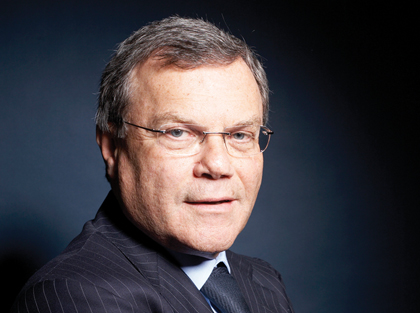
WPP, the largest marketing communications group in the world, has reported pre-tax profits of £1.49 billion for 2015, an increase of 2.8%. Group revenues for the year, meanwhile, were up 6.1% to £12.2 billion.
In terms of revenues, all geographic business units performed well. North America, the group’s largest geographic unit, chalked up revenues of £4.49 billion while the UK accounted for £1.7 billion. Western Europe, meanwhile, weighed in with revenues of £1.7 billion while its Asia/Middle East/Latin America/Central Europe division saw revenues of £3.54 billion.
Group CEO, Sir Martin Sorrell, however, warned that despite the strong performance, “the always on, Don Draperish general industry optimism seems misplaced. To survive in the advertising and marketing services sector, you have to remain positive, indeed optimistic, seeing the glass half-full and industry and company reports generally continue, understandably, to reflect that attitude. However, general client behaviour does not reflect that state of mind, as tepid GDP growth, low or no inflation and consequent lack of pricing power encourage a focus on cutting costs to reach profit targets, rather than revenue growth. In addition, there seem to be little, if any, reasons for an upside breakout from the current levels of real or nominal GDP growth, which remain stuck around 3% to 4% and below the pre-Lehman trend rate, which by definition was unsustainable. In fact, in recent months, whilst real GDP forecasts have remained steady, nominal forecasts have deteriorated significantly to under 3%, due to the strength of the US dollar, although the same pundits expect inflation (somewhat optimistically?) to increase in the coming years.”
“In this respect, oil price reductions, the Iranian nuclear “armistice” and the international currency wars have not been helpful black or grey swans. The faster growth markets of the BRICs and Next 11, located in Asia, Latin America, Africa & the Middle East and Central & Eastern Europe continue to grow faster than the slower markets of North America and Western Europe, although the growth gap has narrowed significantly as Brazil, Russia and China have slowed and the United States and United Kingdom and, even some parts of Western Continental Europe, have quickened,” he said.
“Geopolitical issues remain top of business leaders’ concerns. The continuing crisis in the Ukraine and consequent bilateral sanctions, continued tensions in the Middle East and North Africa and the continuing risk, despite the negotiated agreement, of a “Grexit”, or even more seriously now, a “Brexit” from the European Community top the agenda. Lower oil prices and first time and continued quantitative easing in Europe and continued easing in Japan may seem to bottom or underpin the recovery and a continued, but somewhat patchy, United States recovery and United Kingdom and Indian strength may help confidence. But concerns about China, aggravated by the recent renminbi devaluation and stock market decline, and Brazil remain, although we remain unabashed bulls of both.”





















